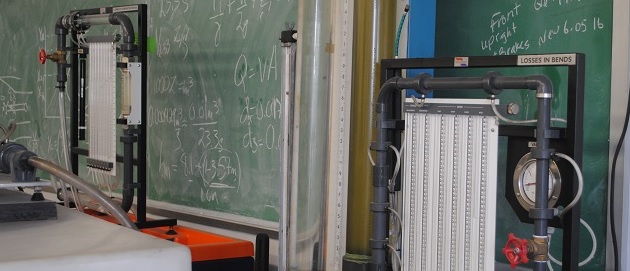
Research Labs
Environmental Engineering Research
Research in Environmental Engineering is a key element in the sustainable management of our natural resources. The complexity of the processes requires excellence in fundamental and applied research. At SIUC, we have Faculty and facilities that support a wide range of environmental engineering research and teaching.
The Environmental Research Labs are equipped with state-of-the-art analytical instrumentation including gas chromatography, UV (ultra violet) analysis, TOC (total organic carbon) analysis equipment and 2-D physical models for groundwater research. Current research projects include developing design criteria for air stripping organic contaminants from drinking water, the use of GAC (granular activated carbon) from agricultural bi-products in removing dyes from industrial wastewater, the use of oxygen enhancing treatment walls to promote in-situ bioremediation, the use of surfactants to promote primary recovery of NAPL contaminants in groundwater, and air permeability of soil in the vadose zone.
Geotechnical Engineering Research
“Virtually every structure is supported on soils or rock; those that are not, either fly, float or fall over” (Handy 1995). Therefore, understanding of analysis, design, and research related to the soils, rocks, and similar material cannot be over emphasized.
The School of Civil, Environmental and Infrastructure Engineering at SIUC has a state-of-the-art geotechnical engineering research laboratory. Most of the instruments are less than five years old. The geotechnical engineering research laboratory is equipped to perform shear strength tests using triaxial compression and direct shear equipment, hydraulic conductivity tests using flexible wall permeability equipment, consolidations tests, swelling tests, California bearing ratio tests, and bearing capacity tests on model foundations. Most of the equipments are attached to a digital data acquisition system for obtaining precise measurements. Currently, the geotechnical engineering experimental research projects include determination of strength stiffness and durability of soils and similar materials amended with various admixtures, tensile and flexural strength characteristics of soils and similar materials, and effects of geogrids on the bearing characteristics of various soils.
Water Resources Research Lab
The Water Resources Computational Laboratory within SIUC's School of Civil, Environmental and Infrastructure Engineering houses two networked Pentium IV, 650 MHz PCs, one Pentium III, 500 MHz PC, and a Xeon 3.6 GHz (dual processor) PC. An array of software is available, including the latest programming environments and compilers (e.g., Fortran, Visual Basic, C++) and Geographic Information System packages (e.g., ArcView 3.3, ArcGIS 8.2, Spatial Analyst, 3D Analyst), as well as typical word processing and spreadsheet software. These computing facilities are being used to test new computational algorithms and to construct state-of-the-art computer simulation and spatial decision support models. The models combine traditional hydraulic engineering and hydrology principles with new search algorithms to provide solutions to a variety of complex problems in environmental and water resources engineering. Examples of work include the development of basin-scale optimal control models for evaluating landscapes that minimize the impact to water quality and quantity; construction of dam operations models to control sedimentation, flooding, and/or ecological impact in multi-reservoir river networks; and the formulation of methods for optimal design of stormwater systems, culverts, and spillways.
Structural Engineering Research
Research in structural engineering is essential for the development of the design criteria to (1) maintain the normal functionality of, (2) limit the damage of, and (3) avoid the collapse of the structure under extreme external loads. The School of Civil, Environmental and Infrastructure Engineering at SIUC has faculty members and facilities that dedicate and support a wide range of research in structural engineering.
The structural engineering research laboratory at SIUC is equipped with computers and the computer software that is able to perform the linear and nonlinear static finite element analysis for concrete and steel structures in various types of structural systems. These structural systems include the concrete shear wall, steel braced frame, and steel moment-resisting frame systems. Current structural engineering research projects include (1) modeling and simulation of steel structures subject to seismic forces; (2) probabilistic assessment of the strength, ductility, and integrity of steel structural systems and related connections against progressive collapse; (3) development of innovative reinforced concrete structural systems and related reinforcing details against progressive collapse; (4) assessment of the P-Delta effects on the overall story drifts of structural frames; and (5) establishment of the displacement amplification factors to estimate the inelastic displacement demands for steel moment frames with various types of connections.
